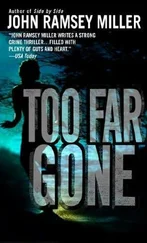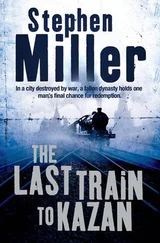John Miller - The Last Family
Здесь есть возможность читать онлайн «John Miller - The Last Family» весь текст электронной книги совершенно бесплатно (целиком полную версию без сокращений). В некоторых случаях можно слушать аудио, скачать через торрент в формате fb2 и присутствует краткое содержание. Жанр: Триллер, на английском языке. Описание произведения, (предисловие) а так же отзывы посетителей доступны на портале библиотеки ЛибКат.
- Название:The Last Family
- Автор:
- Жанр:
- Год:неизвестен
- ISBN:нет данных
- Рейтинг книги:4 / 5. Голосов: 1
-
Избранное:Добавить в избранное
- Отзывы:
-
Ваша оценка:
- 80
- 1
- 2
- 3
- 4
- 5
The Last Family: краткое содержание, описание и аннотация
Предлагаем к чтению аннотацию, описание, краткое содержание или предисловие (зависит от того, что написал сам автор книги «The Last Family»). Если вы не нашли необходимую информацию о книге — напишите в комментариях, мы постараемся отыскать её.
The Last Family — читать онлайн бесплатно полную книгу (весь текст) целиком
Ниже представлен текст книги, разбитый по страницам. Система сохранения места последней прочитанной страницы, позволяет с удобством читать онлайн бесплатно книгу «The Last Family», без необходимости каждый раз заново искать на чём Вы остановились. Поставьте закладку, и сможете в любой момент перейти на страницу, на которой закончили чтение.
Интервал:
Закладка:
She thought of the reviews from her last show, which her daughter had insisted on reading aloud at the breakfast table. “The subjects get in close, mesmerize, and then tear you to pieces,” Roger Wold had written in the Times-Picayune… “They are images of angels… modern martyrs… exciting to some for that very reason. Classically erotic… This is art that may just turn on you as time passes.” Some people wanted art to move them, and if the work could keep moving them as time passed, all the better. That was worth money, and the flow of money allowed Laura to live in a house built in 1840 and paint in a ballroom where Jefferson Davis had once danced and refrain from dipping into her principal.
This particular painting was of Paul Masterson as he existed in her heart. Physically wounded, emotionally terrified, alone and packed to bursting with guilt. A lot of her work centered on Paul because he had left her filled with pain and confusion, and she was trying to resolve the conflicts in her heart on canvas. Even when she had other subjects in mind, when she began a painting he would often invade the work by appearing in part as he did in this large canvas. The set of Paul’s jaw, the line of his ears, the bright blue of his single eye, the angle of the mouth, the attitude of the head, a shape, a frown or a ghost of a smile, might take form. Consciously she thought she had her feelings for him licked; subconsciously, every time she thought about him, it was as though someone stumbling around inside her head had kicked over a bucket of electric eels.
Some of the people who had purchased her early paintings had sold them to get rid of them, possibly because the owners had become irritated with them or had decided to change the style of their art as part of a redecoration. To their delight there had been a ready market for the pieces, and profits were made. The kind of people who enjoyed being bothered, or who wanted their walls to have personality and their collections to appreciate, snapped up Laura Masterson paintings as fast as they became available. She had been forced to hire an agent to compile a waiting list and negotiate prices. The bidding for the privilege of being seduced and disturbed had driven her prices from two thousand dollars for the first canvas, completed five years ago, to forty thousand in four short years. Now Laura showed at prestigious galleries in New York, Chicago, San Francisco, and in a few months’ time would launch a show in Berlin. Her work was perfect for the German market, Lily Turner, her agent, had said. “The sausage eaters”-Lily called the Germans that-“will devour them happily at one hundred thou a pop.”
Laura wandered back to the table, dropped a brush into the baby-food jar filled with thinner, and watched as it influenced the turpentine to a cloudy rose. She let the brush become saturated and then cleaned it carefully, squeezing the bristles in folds of soft cloth until the damp spots were clear of hue. After she had cleaned all of the brushes and her hands, she dropped the bits of turpentine-saturated cotton cloth into the lidded rubbish can. She looked at her watch. It was three A.M.
She glanced at the chair across the studio where Reid Dietrich, her boyfriend, often sat and either read or simply studied her as she worked. He was a perceptive critic, and having him there was always a comfort. Tonight he had gone off to her bed upstairs to await her retirement. Sometimes he did that; tonight he had not spoken but had simply disappeared from the studio. She had been so wrapped up in her painting that she hadn’t taken direct notice of his disappearance-she couldn’t recall the specific act of his leaving, but she knew that he had kissed her cheek; he always did that when he left her alone. Often when she worked she lost hours and sometimes an entire day. During those times she might agree to some request from her children and not recall having spoken to them at all.
Laura Masterson often worked well into the night, passing through the hour of the wolf. Sometimes the golden rays of morning sun would break through the tall windows as she worked-covered to the elbows in paint flecks. The rays would come through the beveled glass and echo the rainbow on the walls and burn long orange waves across the floorboards. But no matter what, she was the one who awakened her children in the mornings, fed them, watched over them, hugged and kissed them and put them to bed. For Laura the desire to be a mother to her children was far stronger and more important than the desire to paint. I can paint after they are in their own lives and I am here alone. She had not had to make a choice between her career or her family, as some did.
Laura’s house had been constructed in a time when craftsmen bundled their hand tools in canvas bags and roamed the country like soldiers, spreading the doctrine of hand-carved moldings, bright murals that brought the wonders of nature indoors, decorative masonry, form-fitted and wood-pegged cypress-beam skeletons with oak floors as solid as chopping block. The house was located off St. Charles in the Garden District, built by people who had every reason to imagine the house would stand forever, a monument to grace, form, and function.
The structure had been mauled and divided in the 1950s when an owner’s heir had decided the property had to generate capital. The house was made into seven separate apartments. It was all but abandoned to the elements when she had come across it.
Laura had never painted for money. She had inherited a lot of money from her father, who had been a tax attorney and had sat on the board of the Whitney Bank. She had used some of that money as leverage to buy and restore the house to its original floor plan, but she had taken her time furnishing it. The kitchen was large and open and modern, the rest of the house filled with antiques.
The lot on which the house sat was just under two acres, encased in a six-foot wall of stuccoed brick. Sections of the yard had been allowed to develop a will of their own, and at the rear of the property the paths had become a thick tangle of angry vegetation armed with cruel teeth, barbs, and razor edges that challenged passage of all but the most feral of varmints.
The house itself was two stories, and the first-floor joists stood four feet from the ground. Wide wooden steps led up to the wraparound porch with its large columns. Laura had added a swimming pool with living bamboo walls on three sides and liked to sit there by the water and think.
The dog, Wolf, shook his body and followed Laura up the wide staircase to the second floor. She always looked in on the children before she went to sleep, whatever the time.
Reb, who had selected the nickname himself at an early age, having decided that the name Adam lacked something crucial, was nine. He was slight of frame, with his mother’s light-red hair and pale skin, and he slept twisted up in a yellow-and-red nylon sleeping bag winter, summer, spring, and fall. Laura referred to the bag as Reb’s cocoon. His room was in constant turmoil, with toys scattered, a hamster cage with one occupant, a gray cockatiel named Biscuit, and comic books layering the rug like scales. Laura made a mental note to make him straighten up on Saturday. She didn’t mind letting him express himself by living in disorder, but she wanted him to learn some discipline. The dog walked in, looked at the sleeping bundle of bird, sniffed the hamster, which was running inside the wheel, and then curled up beside the boy’s bed. He would stay there unless Laura passed by going back downstairs.
Erin’s room was the opposing camp in more ways than one. She was fifteen and had inherited her father’s finely chiseled features, blond hair, and the single-minded drive he’d had before the infamous Miami massacre. Erin made straight A’s, was businesslike and precise, and was at the age where she had no patience with her mother and most especially her little brother. She found her mother’s art disconcerting and tasteless and objected to her leaving any of her paintings on any wall, outside the studio, for more than a couple of days. She called it showing off. Reb, on the other hand, loved his mother’s work and often painted with her in her studio. For nine he was advanced and possessed a remarkable feel for color, balance, and design.
Читать дальшеИнтервал:
Закладка:
Похожие книги на «The Last Family»
Представляем Вашему вниманию похожие книги на «The Last Family» списком для выбора. Мы отобрали схожую по названию и смыслу литературу в надежде предоставить читателям больше вариантов отыскать новые, интересные, ещё непрочитанные произведения.
Обсуждение, отзывы о книге «The Last Family» и просто собственные мнения читателей. Оставьте ваши комментарии, напишите, что Вы думаете о произведении, его смысле или главных героях. Укажите что конкретно понравилось, а что нет, и почему Вы так считаете.












